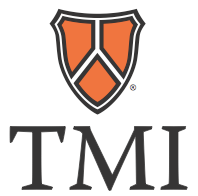West Texas Military Academy
| TMI-The Episcopal School of Texas | |
|---|---|
 |
|
| Address | |
|
20955 West Tejas Trail San Antonio, Texas 78257 United States |
|
| Coordinates | 29°38′18″N 98°36′16″W / 29.638292°N 98.604333°WCoordinates: 29°38′18″N 98°36′16″W / 29.638292°N 98.604333°W |
| Information | |
| Type | Preparatory, boarding |
| Motto |
Nihil Supra Mores Ducit qui Servit |
| Religious affiliation(s) | Episcopal Church in the United States of America |
| Established | 1893 |
| Founder | James Steptoe Johnston |
| CEEB code | 446255 |
| Chairman of the Governors | The Rt Revd Gary R. Lillibridge, DD |
| Headmaster | John Cooper, PhD |
| Faculty | 46 |
| Enrollment | approximately 475 |
| Average class size | 12 students |
| Student to teacher ratio | 7:1 |
| Campus | 80 acres (320,000 m2) |
| Color(s) | |
| Song | For the Splendor of Creation |
| Athletics | 19 Interscholastic Sports |
| Mascot | Prima the Panther |
| Accreditations | Independent Schools Association of the Southwest (ISAS) |
| School fees | $23,450(day students); $42,425 (5-day boarding) $46,525 (7 day boarding students, American or international) as of 2016 |
| Website | http://www.tmi-sa.com/ |
TMI — The Episcopal School of Texas (in full Texas Military Institute) is a selective coeducational Episcopal college preparatory school with a military tradition in San Antonio, Texas for boarding and day students. It is the flagship school, and sole secondary school, of the Episcopal Diocese of West Texas. TMI is the oldest Episcopal college preparatory school in the American Southwest. Founded as West Texas School for Boys, the school was later known as West Texas Military Academy, and popularly nicknamed 'West Point on the Rio Grande', though it is several hours from the Rio Grande itself.
TMI was founded in 1893 by the Rt Revd James Steptoe Johnston, DD, Second Bishop of West Texas in the Protestant Episcopal Church. Johnston was a native Mississippian of the planter class who had participated in twelve engagements in the Civil War. He fought most of these battles with the Eleventh Mississippi Regiment.
Johnston's earliest name for his school in San Antonio was "The West Texas School for Boys," which was quickly changed to "West Texas Military Academy" (WTMA). In 1926, the name was changed to Texas Military Institute.
At the time of the school's foundation, San Antonio lay on the edge of the American frontier, with forts all along the high ground east of the Rio Grande. Though Bishop Johnston wanted his boys to receive as good an education as boys anywhere in America, he knew that a New England-style prep school would not work in West Texas, so he created a premier academic school with a full-fledged military discipline. The specifically Southern boarding school tradition was not often military.
Bishop Johnston saw the need to provide young men with a classical liberal and scientific education that would enable them to go on to careers in business, agriculture and ranching, the Church, the civil service, and the officer corps of the United States Army. He set out to develop "the Christian character amongst the rising generation... for character is the only true wealth." He assumed that "the best use of wealth is to coin it into character." The quotation shows that WTMA was part of the "church school movement" of the nineteenth century, which featured character formation as the means to personal success in many areas, including academic pursuits. Hence, WTMA may be counted among other church schools such as Saint James in Maryland (1842), St. Paul's in New Hampshire (1856), the Shattuck-St. Mary's School in Minnesota (1858), St. Mark's in Southborough MA (1865), Groton School in MA (1884), and St. George's School in Rhode Island (1896).
...
Wikipedia
